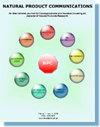金合欢(Hayne)和糙叶女贞提取物可促进感染耐甲氧西林金黄色葡萄球菌的秀丽隐杆线虫的存活率
IF 1.4
4区 医学
Q4 CHEMISTRY, MEDICINAL
引用次数: 0
摘要
背景:金黄色葡萄球菌(S. aureus)是皮肤和软组织感染的主要病因,抗生素耐药菌株可能导致危及生命的疾病。本研究使用感染了甲氧西林易感(MSSA)和甲氧西林耐药(MRSA)金黄色葡萄球菌菌株的秀丽隐杆线虫(C. elegans)体内模型,探索金合欢(Acacia ehrenbergiana (Hayne) )和糙叶金银花(Prosopis juliflora)的抗菌潜力。方法:使用琼脂基杀灭试验将野生型 elegans 暴露于 MSSA 菌株 ATCC 25923 和 MRSA 菌株 ATCC BF195 及 ATCC BC 3820。通过分析受感染和未感染蠕虫的存活率,评估了 A. ehrenbergiana 和 P. juliflora 的乙醇提取物对受感染 elegans 存活率的影响。此外,还研究了植物提取物对 elegans 摄食率以及 MSSA 和 MRSA 在蠕虫肠道中定植的影响。此外,还进行了体外试验,以评估植物提取物的杀菌和/或抑菌作用。结果暴露于 MSSA 和 MRSA 菌株会显著降低 elegans 的寿命,平均死亡时间(TDmean)为 72 ± 1.3 h。提取物不会影响秀丽隐杆线虫的咽部泵送。菌落形成单位(CFU)测定显示,茱莉花提取物能显著减少 MSSA 和 MRSA 在蠕虫肠道中的定植,而 A. ehrenbergiana 提取物则不能。体外最低抑菌浓度(MIC)测定表明,这两种提取物都没有直接的杀菌活性,这表明所观察到的蠕虫细菌感染的减少可能是由于宿主免疫反应的增强,而不是直接的抗菌作用。结论这些研究结果表明,A. ehrenbergiana 和 P. juliflora 提取物可通过间接机制(可能涉及免疫系统激活)提高优雅小花藻在感染后的存活率。本研究强调了这些提取物作为抗 MSSA 和 MRSA 菌株的抗菌剂的潜力。本文章由计算机程序翻译,如有差异,请以英文原文为准。
Acacia ehrenbergiana (Hayne) and Prosopis juliflora Extracts Promote the Survival of Caenorhabditis elegans Infected with Methicillin-Resistant Staphylococcus aureus
Background: Staphylococcus aureus (S. aureus) is a leading cause of skin and soft tissue infections, with antibiotic-resistant strains causing potentially life-threatening diseases. This study explored the antimicrobial potential of Acacia ehrenbergiana (Hayne) and Prosopis juliflora using a Caenorhabditis elegans (C. elegans) in vivo model infected with methicillin-susceptible (MSSA) and methicillin-resistant (MRSA) S. aureus strains. Methods: Wild-type C. elegans were exposed to MSSA strain ATCC 25923 and MRSA strains ATCC BF195 and ATCC BC 3820 using an agar-based killing assay. The impact of ethanol extracts from A. ehrenbergiana and P. juliflora on the survival of infected C. elegans was assessed by analyzing the survival rates of infected and non-infected worms. The effects of the plant extracts on C. elegans feeding rate and colonization of MSSA and MRSA in the worm's gut were also examined. Additionally, in vitro assays were conducted to assess the bactericidal and/or bacteriostatic effects of the plant extracts. Results: Exposure to MSSA and MRSA strains significantly reduced C. elegans lifespan, with a mean time to death (TDmean ) of 72 ± 1.3 h. Treatment with 100–500 μg/ml of either plant extract increased C. elegans survival by 65–70%. The extracts did not affect C. elegans pharyngeal pumping. Colony-forming Unit (CFU) assays showed a significant reduction in MSSA and MRSA colonization in the worm intestine with P. juliflora, but not A. ehrenbergiana extracts. In vitro Minimum Inhibitory Concentration (MIC) assays indicated that neither extract had direct bactericidal activity, suggesting the observed reduction in bacterial infection in worms was likely due to enhanced host immune response rather than direct antibacterial effects. Conclusion: These findings suggest that A. ehrenbergiana and P. juliflora extracts enhance C. elegans survival upon infection through indirect mechanisms, possibly involving immune system activation. This study highlights the potential of these extracts as antibacterial agents against MSSA and MRSA strains.
求助全文
通过发布文献求助,成功后即可免费获取论文全文。
去求助
来源期刊

Natural Product Communications
工程技术-食品科技
CiteScore
3.10
自引率
11.10%
发文量
254
审稿时长
2.7 months
期刊介绍:
Natural Product Communications is a peer reviewed, open access journal studying all aspects of natural products, including isolation, characterization, spectroscopic properties, biological activities, synthesis, structure-activity, biotransformation, biosynthesis, tissue culture and fermentation. It covers the full breadth of chemistry, biochemistry, biotechnology, pharmacology, and chemical ecology of natural products.
Natural Product Communications is a peer reviewed, open access journal studying all aspects of natural products, including isolation, characterization, spectroscopic properties, biological activities, synthesis, structure-activity, biotransformation, biosynthesis, tissue culture and fermentation. It covers the full breadth of chemistry, biochemistry, biotechnology, pharmacology, and chemical ecology of natural products.
Natural Product Communications is a peer reviewed, open access journal studying all aspects of natural products, including isolation, characterization, spectroscopic properties, biological activities, synthesis, structure-activity, biotransformation, biosynthesis, tissue culture and fermentation. It covers the full breadth of chemistry, biochemistry, biotechnology, pharmacology, and chemical ecology of natural products.
 求助内容:
求助内容: 应助结果提醒方式:
应助结果提醒方式:


